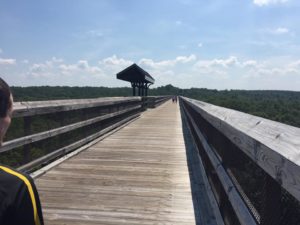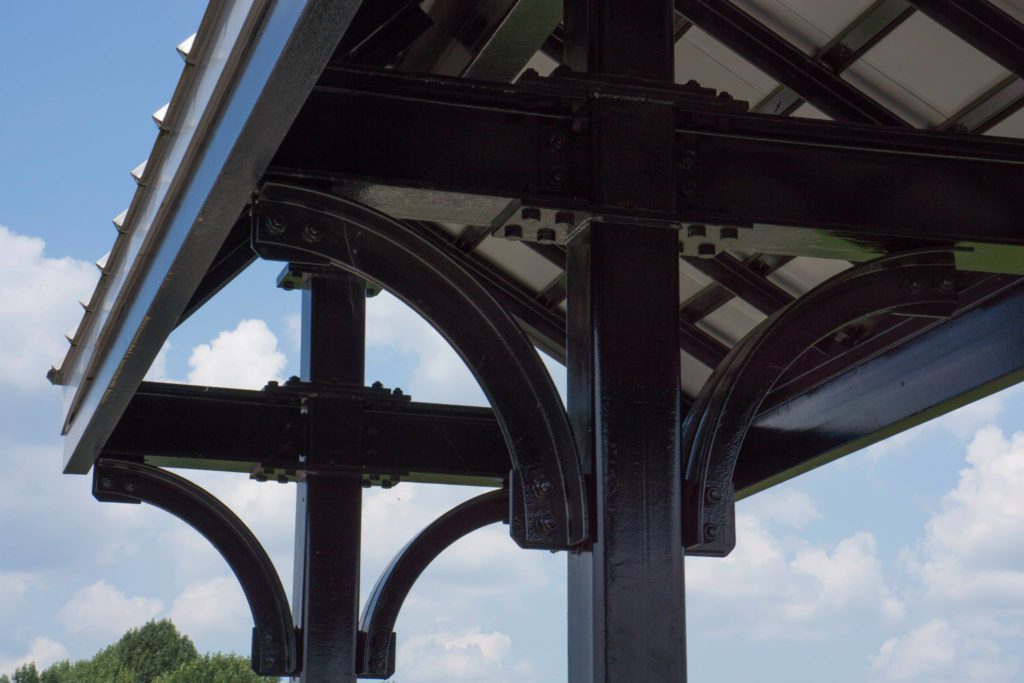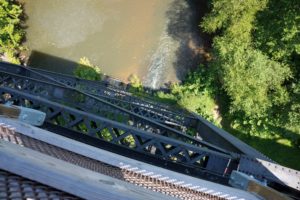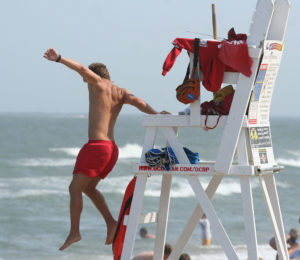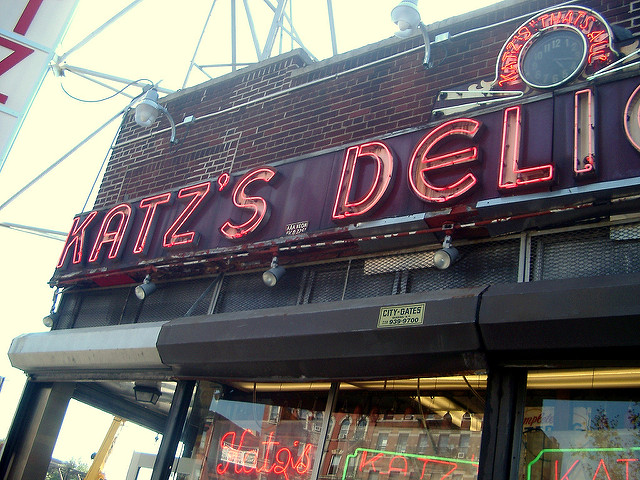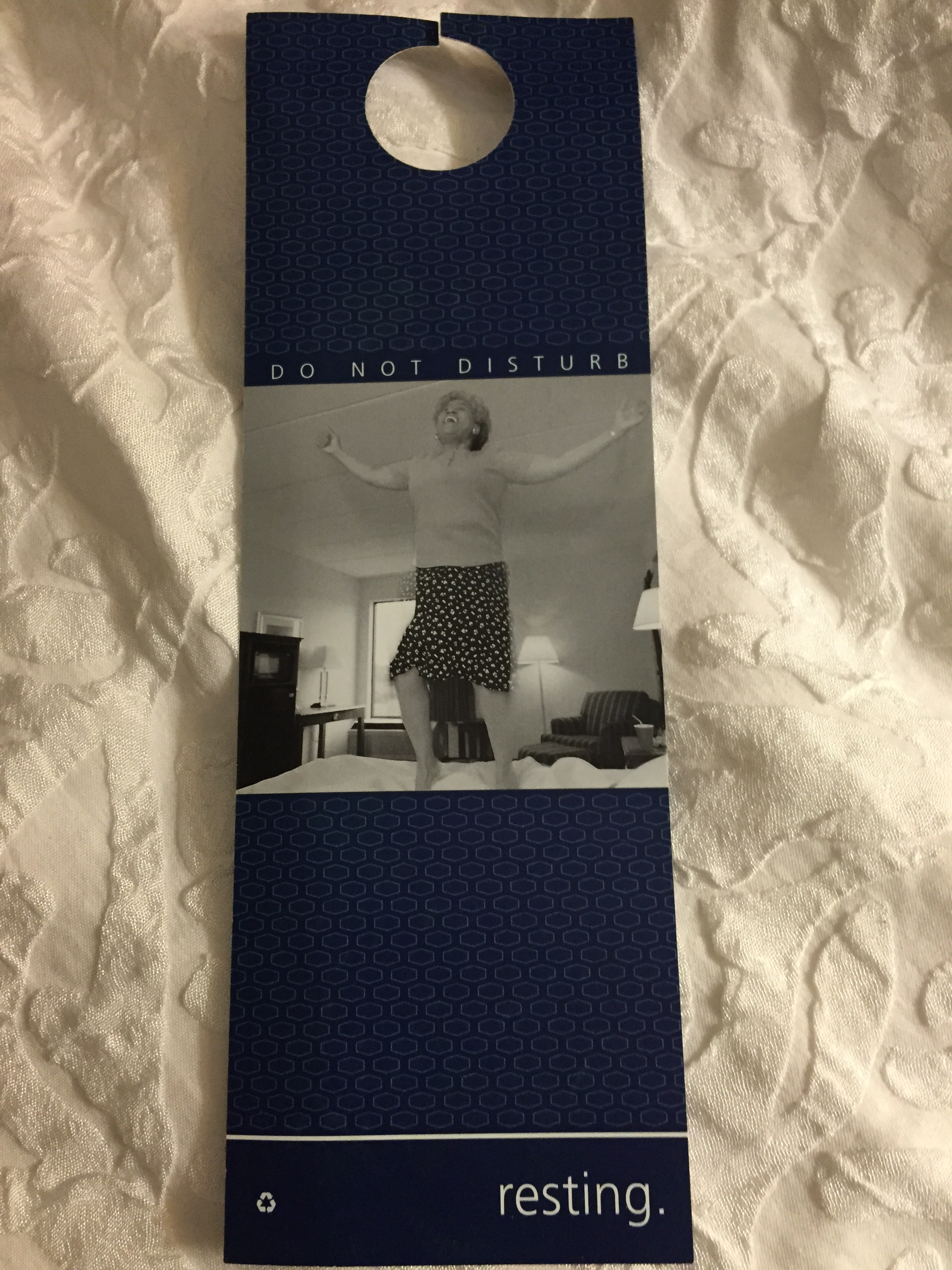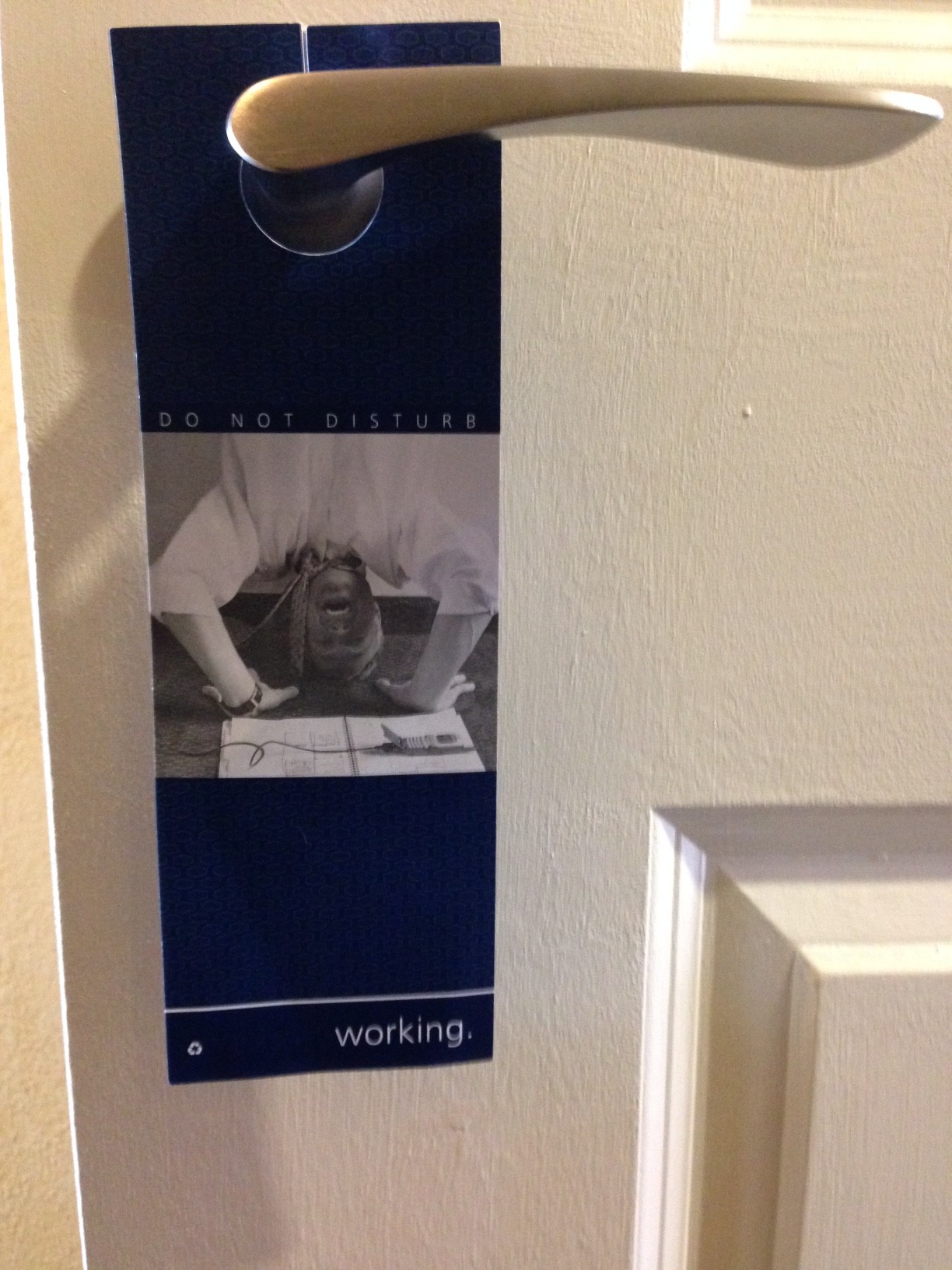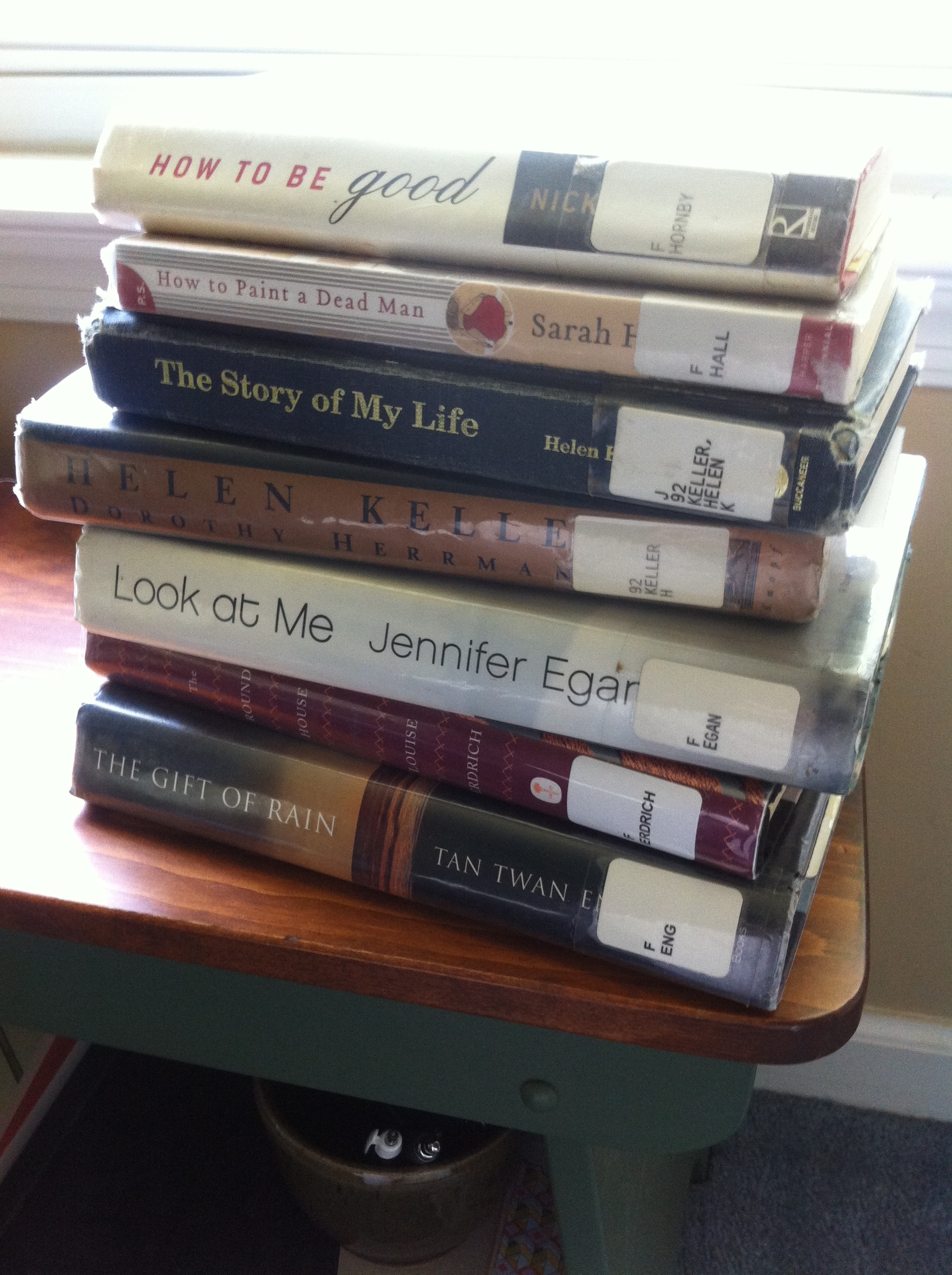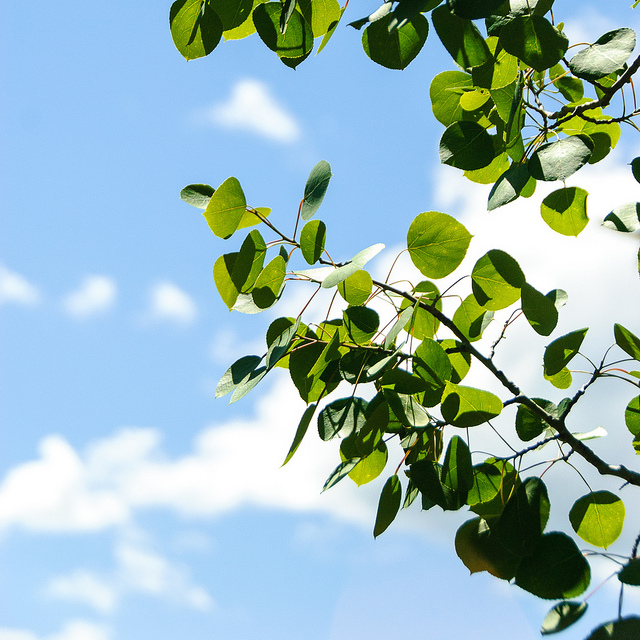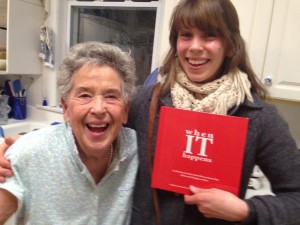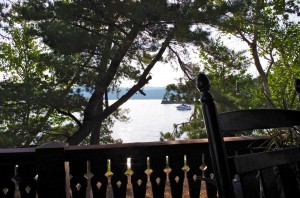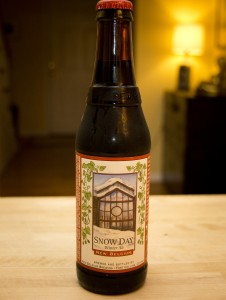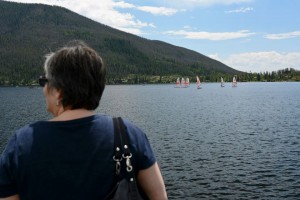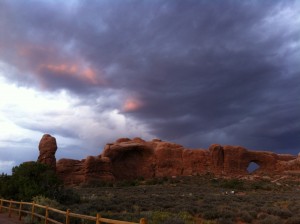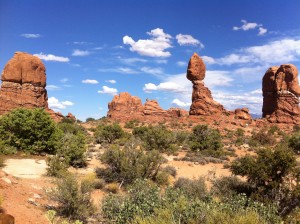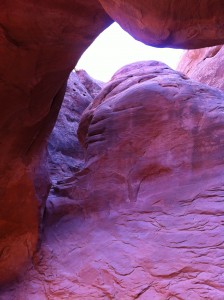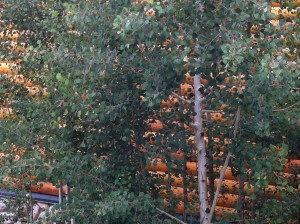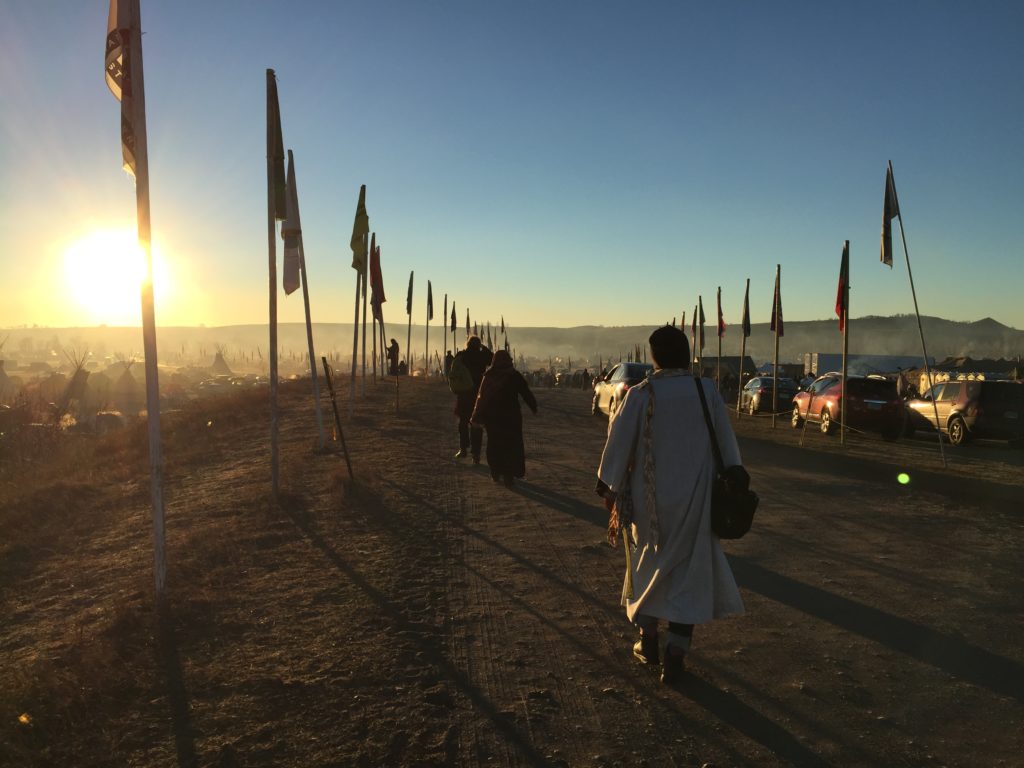
Walking into Oceti Sakowin Camp with the sun rising, Standing Rock Sioux Nation, 11/3/16
A sermon preached on Luke 21: 5-19 and Isaiah 65: 17-25, on November 13, 2016, at the Wesley Foundation at UVA.
As I think you all know by now, last week I traveled to North Dakota, to the Standing Rock Sioux Reservation. I had been watching the news for more than a month, learning about the multiple Native tribes who had come together to camp out on the prairie to protect the water of the Missouri River, where a company from Texas has been making its way across four states with an oil pipeline (called the Dakota Access Pipeline), including plans to tunnel under the Missouri River, just north of the Standing Rock reservation. I had read about the original route for the pipeline, which was supposed to cross under the river north of Bismarck (about an hour’s drive north of the reservation). But the people in Bismarck thought that sounded dangerous and risky to them and their water, so the plans changed to avoid that town – but not to avoid the risks to water contamination all together. I had read about the peaceful prayerful protests and about indigenous people from all over the globe traveling to North Dakota to support and stand with the Standing Rock Sioux. Since last April, thousands of people have been camping and protesting and trying to protect the water. In the last month, a highly militarized police and security force began shooting rubber bullets at peaceful protestors and at even at their horses. A private militia hired by the oil company set dogs on protestors, some of whom were mauled. Authorities in riot gear have used pepper spray and sound cannons on peaceful, prayerful protestors exercising their first amendment rights – protestors and water protectors who are bathed every day in prayer and who pray daily for those officers. Authorities have locked up journalists who have tried to cover the events and have thrown over 400 people in jail on contrived charges in attempts to intimidate them into stopping and disbanding. In jail they have needlessly strip-searched people in order to humiliate and further intimidate them. They have shipped some of those in custody to jails several hours away, to make it harder to get back home again or find rides when they are eventually released, sometimes on bail as high as $1500 per person. When their court dates come around, they will be required to travel hours back to those other towns to appear. Police are using helicopters and drones constantly circling overhead and they have road blocked the main highway between the reservation and Bismarck. They constantly stand guard at the roadblock with additional forces keeping watch from the nearby ridges.[i]
As things came to a head and became violent in this past month, the Standing Rock Sioux Nation and other Native groups I’ve been following began asking explicitly for more people to join them. We need numbers, they said. We need them to see we won’t go away and we aren’t alone. Please help us. I kept reading and following and praying. I didn’t really think about going. It’s the middle of the semester. It’s a really long way away. Wouldn’t it be better to send them money for winter supplies? It didn’t seem reasonable or feasible. Then Rev. John Floberg, a feisty crusty old Episcopal priest who’s been serving in the communities on and near the Reservation for 25 years, sent out a call to clergy. It’s time to come, he said. I know it’s inconvenient and this is short notice but this is it. They need us. We can provide a protective witness for their struggle. He was hoping to get 100 clergy and over 500 of us answered the call. But I told colleagues and friends who were going “no” at least twice before I changed my mind. I told God “no” more than that. But it wouldn’t leave me alone. All the same “reasonable” things popped up – money, time, effort, inconvenience, family commitments… As I pondered and said “no” and delayed, the airline tickets kept going up. Wouldn’t it be better to send them $1000 for food and warm clothes and winter camping supplies? What am I going to do? But the Holy Spirit would not leave me alone and the people of Standing Rock kept saying, We need help. We need you to come. At some point in that epic week of wrestling with God about this decision, I realized that, unlike so many many things in the world, this is something I am qualified to do. I am a person who prays; I am a visible sign of the church; I have a body and I’m able and well enough to travel. I don’t know what to replace pipelines with or how to implement renewable energy plans. I don’t know how to map an alternate route for this pipeline. I couldn’t convene a meeting with President Obama or film a documentary about this struggle. But I was absolutely qualified to put on my clergy garb and say “yes” to my far away neighbors who needed help I could provide, and spend some money and travel in the middle of the night and stand in the middle of the prairie with them and pray.
I am not telling you this so you will praise me or come tell me after worship how amazing it is that I went. I do appreciate the support and prayers from Wesley folks and others in Charlottesville as I answered that call, but that’s not why I’m telling you this now. I’m trying to let you in on, as best I can, how inelegant and clumsy and wrestling-match-like my discernment was – and how blessed I was by choosing to go where and when I was asked, to offer what was asked of me, and not to rationalize or monetize my way out of it.
Most importantly, I am telling you this in the hopes that when you hear someone’s request or see someone in need of help and solidarity, you won’t take as long as I did to wrestle it out.
The pipeline may or may not be stopped or re-routed and you may or may not think pipelines are a bad idea – but there are not “two sides” to this situation. For Christians, the only side is to stand up for and to stand with those who are being beaten and jailed and harassed and intimated without any just cause.
This sermon is not about the election, exactly. It’s about how Christians are called to act no matter who is in power, no matter how prosperous and peaceable the times, no matter how war-torn and uncertain.
Luke records Jesus saying, as the disciples admired the stonework and the architecture of the temple, “As for the things you are admiring, the time is coming when not even one stone will be left upon another. All will be demolished.” When Luke writes down those prophetic words of Jesus the temple’s destruction is already 15 years ago for Luke’s own audience.
Jesus says, This is impressive and beautiful but it will be dust. It will not stand the test of time. It will be destroyed. He stands in the shadow of the empire and the religious institutions of his day telling his band of followers that everything will crumble and war will break out and they will be arrested and persecuted – but that, even in the midst of all that, God is still counting the hairs on each of their heads. By enduring, holding tight to God alone, they will “gain their lives” (v. 18).
Jesus does not promise wealth or peace between the nations of the world. He does not promise that the institutions and the things they love about the current regime will be spared. He promises natural and human-made destruction, famine, health epidemics, kingdoms collapsing, prison, religious persecution, and betrayal by loved ones. Jesus promises that people will hate us because of him.
Since Election Day incidents of hate speech, graffiti, and intimidation, targeted at Muslims, Blacks, immigrants, and women, have increased. According to the Southern Poverty Law Center and as of 5pm on Friday night, there were over 200 such incidents since Election Day. People have been approached in the street, found graffiti on their apartment doors, been directly put down and threatened in school cafeterias, and more, told to “get out of our country” and “If you aren’t born here, pack your bags.” A Black woman was standing at a traffic light in Louisiana when a truckload of white men pulled up and shouted at her, “F*** your black life!” They laughed and chanted “Trump!” as they drove off. According to Inside Higher Ed, at New York University’s engineering college someone defaced the door to a designated Muslim prayer room, by scrawling “Trump!” across it. Even before Tuesday’s results, we here at UVA have experienced a spate of hateful speech and harassment directed towards Jews, the LGBTQ community, Black students, Muslims, and women. We have seen enough of this here that a collection of student organizations has come together under the name Eliminate the Hate and they are sponsoring a week of activities and events on Grounds this week, to speak out and up against this rising tide.
In the middle of another tumultuous and destructive time, Isaiah wrote (Isaiah 65: 17-19):
For I am about to create new heavens
and a new earth;
the former things shall not be remembered
or come to mind.
But be glad and rejoice forever
in what I am creating;
for I am about to create Jerusalem as a joy,
and its people as a delight.
I will rejoice in Jerusalem,
and delight in my people;
no more shall the sound of weeping be heard in it,
or the cry of distress.
Isaiah wrote these words to the war-torn remnant of Israel who were finally returning home after 60 years as captives in Babylon. They are words of hope but they must have been a teary and anguished hope to the people’s ears as their eyes took in their destroyed homes and vineyards and towns. Nothing was intact or as they had left it. They had to start over again. “The former things shall not be remembered or come to mind”…”be glad and rejoice forever in what I am creating”…It must have seemed impossible to those returning exiles that they would forget what had happened, that standing in the rubble of their former lives they could ever forget the world-shifting loss or that moment or any of those long 60 years. It must have seemed insane to stand in that situation in that moment and be told to “rejoice” in what God was creating. Where, God? Exactly where in this mess is your beautiful handiwork?
But God promises that the houses and vineyards they build will not be in vain. They will make it through to live in them and to harvest the fruit. Their hard and faithful work of rebuilding will not be in vain. God promises to answer before the people even ask, before they call out again.
Spoken into a broken time of uncertainty and great fear, Isaiah proclaims that even though you may not be able to see it yet, God is still working. What looks ugly and destroyed is the fertile soil for what grows next. Hang on and hope, because here’s what you will see soon.
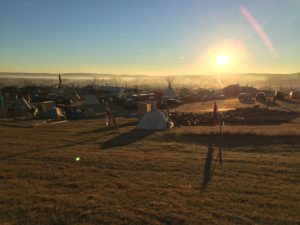
Sunrise over Oceti Sakowin Camp, Standing Rock Sioux Nation, 11/3/16
One of the things I noticed at Standing Rock was how the Native people referred to others as “relatives.” There is a loudspeaker in the camp and as the morning was getting started around the sacred fire, someone came on and said, “Good morning, relatives!” When indigenous people from around the world arrive at Standing Rock, they say, “Our relatives from New Zealand and Hawaii are here.” This deep recognition of their connection as indigenous people, across country and landscape, is the basis for this huge gathering of tribes (nothing like this has been seen in more than a hundred years).
Since I returned home, I’ve been following Lyla June Johnston, a Navajo woman who spoke to the clergy group and joined us in our prayer and protective action. She impressed and humbled me when she described the Walk of Forgiveness she was organizing for the Sunday after we were there. She talked about how important it was for all of us to join them in their stand and encouraged those of us who are white, descendants of colonizing settlers, to be proud of our own family lineage but also to admit to what our people have done. She said, “Your job is to acknowledge what happened and Native peoples’ job is to forgive.”
This week after the election she posted this prayer to Facebook: “Creator may you bless my dear uncle Donald Trump. May you help him to heal. May you help him to feel Your Love. May you help to ease his fears and help him to sense Your True Blessing. Help him to forgive himself and others so he may be free. And most of all, just give whatever blessing you would have for Your son, and my uncle. May we continue to retain our nature in the spirit of Your unconditional and restorative love and forgiveness. May we continue to work for health and justice with love for the unhealthy and the unjust. #NotMyPresident #JustMyUncle #Ké” [K’é means kinship]
This is the result of seeing one another as relatives. This is what a Christian prayer ought to sound like. This prayer has meat on it and it’s more daring and courageous and faithful than the mere lip service we sometimes give to the theological understanding that we are “brothers” and “sisters” in Christ. This is the kind of prayer that seeks to create connection and solidarity with some people – and might also make others hate you. Just as Jesus promised.
I don’t think it is a surprise to many of us that we live in a divided country. But it seems this week that we were surprised by just how divided. Almost no one thought Trump would win the election. No one thought the vote would be half and half.
However you voted, half of our brothers and sisters, our relations, voted differently than you did. What I’ve heard most Americans saying this week is “They” didn’t know how many of us there were, or, “They” didn’t know how dangerous their vote was. I have not heard most Americans this week confessing that we have been just fine up until now not knowing or caring about those other relations in that other half. Those aren’t my neighbors.
Rev. John Floberg, who called us out to Standing Rock, reminded us on the night before our protective witness with the Native people, that the police officers we would see across the divide, that barricaded highway bridge, were not our enemies. He reminded us that on the cross Jesus did not rebuke, he forgave – with his dying breath. So, John Floberg said, “We greet the officers with prayer and love and compassion, too.”
This is hard.
Those stones are beautiful but they will be rubble one day. This will not stand.
My life is not in the Democratic Party or even my personal shero Hillary Clinton. My neighbor’s life is not in Trump or the Republican Party or Bernie or any candidates or parties. Our lives, patriotic and democracy-inspired as they may be, are not in these United States. Or in the dream of moving to Canada or making this country “great again.”
Our lives are in Jesus Christ. They will hate us because of Jesus. Keep going. All this destruction and despair? Raw materials for the beautiful new creation of God.
This is not the time to keep your head down and wait for the uneasiness to pass. This is not the time to think I’m not a racist/ I love Muslims/ I don’t sexually assault women/ I welcome immigrants / I care for the disabled and then be done with it as if you have completed your task. This is not the time to think I’m happy with my vote and I’m nice to people and that’s enough.
The election may or may not have gone in the direction you hoped for – but there are not “two sides” to this situation of increased, targeted hate crimes and speech. For Christians, the only side is to stand up for and to stand with those who are being harassed and intimated simply because they are Black or Muslim or immigrants or people with disabilities or women or….
This is not the time to put your head down in prayer and hope it will pass. This is the time to lift your head up, take in the destruction you see, and stare straight in the face of hate while you proclaim and enact and witness to Love.
Love in these times means refusing to eliminate half of our country when you consider who your neighbors are. That means you don’t have “elite” and “uneducated” neighbors; you simply have neighbors with different life experiences than yours and if you don’t understand those, it’s time to learn and to meet some new people, and work on loving them. Love in these times means resisting and standing up to hate in its many insidious forms. Speak out, stand with, and offer to walk alongside those in this community who are targets of bigotry. Literally, offer to walk with students in unsafe situations around Grounds. Use the Just Report It system. Call for help. Keep watch when something seems off. Do not remain silent when people are degrading and demeaning and intimidating and targeting others in speech or action. State unequivocally that hate speech and “us” and “them” commentary is not OK with you. Attend the Eliminate the Hate teach-in to learn about your own blind spots and to walk across some of our community’s divides to meet your relations.
No matter how uncertain and fearful the times, no matter how unfamiliar the landscape, no matter how unknown and un-relatable our neighbors, our relatives – God is creating a new heaven and earth, right now. In the middle of this huge mess. Believe it.
The only temple that will not fall – not even in the face of death itself – is Love. Let’s work with God to build it.
Thanks be to God!
*
Photos are my own.
Endnote:
[i] This is a compiled account from months of reading and following the news. A few good places to learn more and follow the ongoing stand are: https://www.facebook.com/Indigenousrisingmedia/
http://www.democracynow.org/topics/dakota_access
http://standwithstandingrock.net
http://ictmn.lughstudio.com/wp-content/uploads/2016/10/DAPL-Magazine-2016_PREVIEW_r1.pdf
http://westernjurisdictionumc.org/wjumc-bishops-send-letter-to-president-obama-in-support-of-standing-rock-sioux-nation/
http://www.latimes.com/nation/la-na-showdown-at-standing-rock-20161108-story.html
